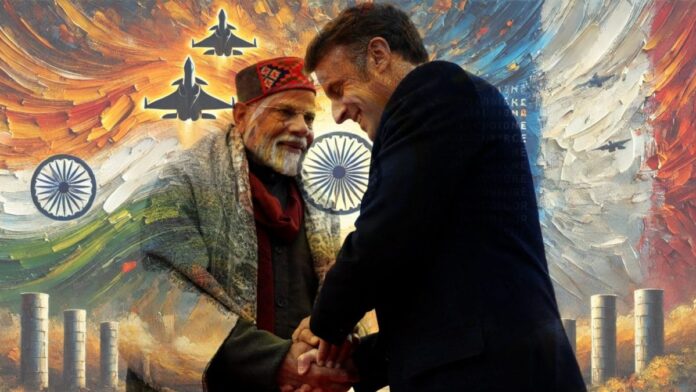Last Updated:
Recognising India as a rising power, France has never strayed from the big picture, nurturing a relationship rooted in loyalty and strategic autonomy

The camaraderie between Modi and Macron was on full display, highlighting a relationship built on trust, loyalty, strategic autonomy, and mutual respect.

Prime Minister Narendra Modi’s visit to France was nothing short of a diplomatic spectacle. From his warm exchanges with French President Emmanuel Macron to co-chairing the Paris AI Action Summit, India’s presence at the global AI stage was impossible to ignore. The camaraderie between Modi and Macron was on full display, highlighting a relationship built on trust, loyalty, strategic autonomy, and mutual respect.
The Paris AI Action Summit aimed to chart a third path in AI development, distinct from the US-led OpenAI model and China’s DeepSeek. While concerns over regulation and safeguards were discussed, the summit’s core focus remained on harnessing AI’s potential with optimism rather than fear. One key agenda was ensuring AI’s inclusivity, particularly for the Global South—an area where India is stepping up as a leader.
related stories
In many ways, this was India’s moment. PM Modi made a strong case for a democratised AI model that is free from biases, highlighting how existing AI tools often reflect political and social prejudices. A viral video of his speech explaining AI biases in simple terms resonated widely on social media. His argument was clear: AI must be trained on diverse, balanced datasets to avoid skewed perspectives.
India’s AI ambitions are backed by a strong talent pool, with around 650,000 professionals in the sector, a number expected to double in two years. Additionally, India’s AI mission, launched in March 2024, is scaling up rapidly, with an initial setup of 10,000 GPUs and plans to add 8,693 more. The cost factor also plays in India’s favour—AI model training in India is projected to be less than half of what it costs globally, thanks to a 40 per cent government subsidy.
While India has made great strides, it must move into mission mode to compete with global AI giants like OpenAI and DeepSeek.
While protections and regulations remained on the agenda, the prime focus was on building AI with an optimistic bent of mind, not scepticism and fear. The entire room was in agreement that humans must harness the power of AI instead of shrugging it off. However, differences remained on other matters. The joint statement was rejected by the US and UK most likely over the promotion of green energy, something that Trump is not bullish on.
With roughly 70 per cent of France’s electricity coming from nuclear energy, Macron has a different view. Referring to Trump’s “Drill, baby, drill,” Macron offers a counter “Plug, baby, plug”, hinting at surplus power in France. This confluence of nations, big tech and AI innovators is expected to invigorate a new saga of AI development, led by India and France. In fact, India is going to host the next AI action summit.
Beyond AI, Modi and Macron co-hosted the India-France CEO Forum, a key event in strengthening economic ties. Another notable moment of the evening was Modi’s meeting with US Vice President JD Vance and his wife, Usha. Following this, Macron and Modi travelled together to Marseille in southern France, where the Indian Prime Minister inaugurated a new Indian consulate and toured the International Thermonuclear Experimental Reactor (ITER) project, as well as the Marseille port.
A RELATIONSHIP ROOTED IN STRATEGIC AUTONOMY
The geopolitics of AI has become a defining strategic issue for nations, and this is where India and France align seamlessly. Both leaders share a vision for a safe, democratised AI model—one that is free from biases and, crucially, independent of the geopolitical tug-of-war between the US and China.
This leads us to an essential aspect of their relationship: strategic autonomy, the foundation of India-France ties. Despite being a US ally, France has consistently pursued an independent path, while India has prioritised its national interest without succumbing to Western pressures.
France has stood by India in critical moments. In 1998, India signed its first strategic partnership agreement with France, ushering in a new era of cooperation. That same year, when India faced immense pressure from the US to abandon its nuclear tests, France refused to join the chorus of condemnation. Instead, then-President Jacques Chirac visited New Delhi as the chief guest at India’s Republic Day parade—one of the record six times that French leaders have held this honour.
Following India’s Pokhran-II nuclear tests in May 1998, France refused to impose sanctions, choosing instead to deepen civil nuclear cooperation. This was not an isolated stance—when India conducted its first nuclear test in 1974, France congratulated rather than criticised. This pragmatic, non-interventionist approach has remained unchanged.
Unlike other Western nations, France does not lecture India on human rights or its ties with Russia.
India and France’s collaboration in AI is a natural extension of their deep-rooted strategic partnership. But this is far from their first major cooperation. The two nations have long worked together across key sectors, including defence, nuclear energy, and space.
DEFENCE TO NUCLEAR: A THRIVING COLLABORATION
A landmark $10 billion defence deal is on the horizon, set to be finalised in April during the French defence minister’s visit. This agreement includes the procurement of 26 Rafale (Marine) jets and three Scorpene-class submarines. In an exciting development, France is also considering India’s Pinaka rocket system, potentially making India a defence exporter to France—a significant milestone and a true win-win for both nations.
France’s defence offerings stand out not just for their quality but also for their competitive pricing and co-development opportunities—an essential factor as India pushes forward with its Make in India initiative in defence manufacturing. The 2016 Rafale deal, which saw India acquire 36 fighter jets, paved the way for Rafale production in India. Similarly, the Scorpene submarines are also being built domestically, strengthening India’s defence industrial base.
Beyond defence, nuclear energy remains a pillar of Indo-French cooperation. France is assisting India in the construction of the Jaitapur nuclear power plant, which, once completed, could be the most powerful in the world. Energy collaboration doesn’t stop there. Back in 2015, Modi and Macron jointly launched the International Solar Alliance, headquartered in New Delhi with 121 member countries. This energy partnership could also play a critical role in powering the next phase of AI development, given the high energy demands of AI technologies.
Over the decades, France has remained steadfast in its commitment to India, recognising not just its economic potential in energy, defence, technology, and space, but also its emergence as a rising global power and a formidable force in the Indo-Pacific. This long-term vision and loyalty is what makes the India-France relationship truly unique and powerful.
The views expressed in the above piece are personal and solely those of the author. They do not necessarily reflect News18’s views.
- Location :
- First Published:
February 13, 2025, 11:46 IST
News opinion Finepoint | Modi-Macron Power Combo: What Makes France Such A Loyal Partner To India?



